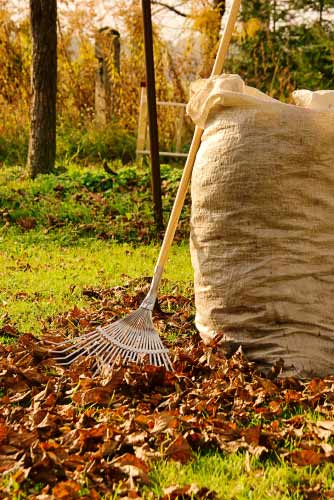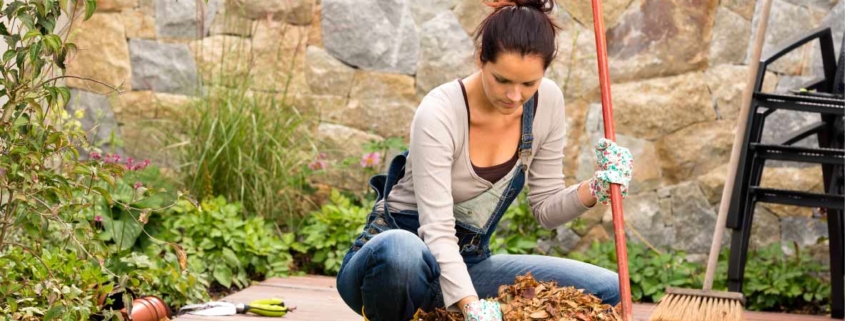Don’t forget about Leaf Day Pickup!
Check the dates below to find out when Leaf Day Pickup is coming to your neighborhood.
Portland Leaf Day Pickup Info 2019
12 Tips for Avoiding Low Back Pain While Raking Leaves
Fall is arguably the most beautiful season of the year. Cooler temperatures, comfy sweaters, the smell of a fire burning in the fireplace and the changing colors of nature that surround us in the beautiful northwest. Raking leaves can be an enjoyable way to spend time outdoors, soaking up the sights and smells of the season. Be careful out there, though, because if you’re not careful you could end up with back pain or sciatica or other potential injuries.
One of the most common complaints following several hours of raking leaves is low back pain. The repetitive movements and constant bending and lifting can wreak havoc on your back. If you’re not careful it’s easy to injure your back, making everyday activities and a good night’s sleep a challenge.
Rose City Physical Therapy is very familiar with back pain experienced by homeowners trying to keep up with constantly falling leaves. Every autumn they see many patients complaining of low back pain and sciatica after a weekend of raking leaves.
“One of the biggest mistakes many people make when raking leaves is not raking with both sides of the body,” says Rose City Physical Therapy. Most people only rake with their dominant hand causing the muscles and other tissues to strain on one side of the body. Switching hands is important to give those muscles a break and to build up strength in the same muscles on the other side.
Original Article found at easyrest.com
1. Warm up. Take a 5-10 minute brisk walk to warm up your muscles. Avoid any stretching of cold muscles prior to the activity. Scientific evidence reports that stretching without a warm-up increases risk of injury and there is no evidence that stretching before an activity prevents injury.

2. Choose the Right Rake. Use a rake that is proportionate to your body size. Using a rake that is too long or too short will cause you to alter your posture and strain your muscles. Consider the rake width. Narrow rakes may make the weight of the leaves lighter but they can also make the job longer. Extra wide rakes gather more leaves but can put more of a strain on your back.
3. Watch Your Posture. Like any exercise, proper form is important. Muscle pain and strain occurs when you put your body in awkward positions and then try to contract or extend muscles in these odd positions. To maintain proper posture while raking keep your legs slightly bent, your weight centered, and reach with your arms and not your back. After every 20 minutes of raking activity stand up, place hands on hips and gently stretch into a back bend for a few seconds 3-5 times especially before lifting anything. Do not extend to the point of causing pain.
4. Switch Hands Frequently. You exhaust your muscles with repetitive motion. Switch your lead arm frequently while raking to prevent, or alleviate, muscle exhaustion
5. Bend With Your Knees. When lifting leaves keep your back straight and bend with your knees and hips, not your back, when reaching down. The power for your lift comes from your buttocks and legs. Make the piles small to decrease the weight.
6. Rake With the Wind. Let Mother Nature give you a hand if possible. Rake leaves with the wind, even if the spot in the yard is different from where you wanted to rake the leaves.
7.Use a Tarp. Leaves are lightweight and can easily be moved on a tarp. Rake the leaves onto the tarp and pull one end of the tarp to move the leaves to your desired location. Doing this can save your back constant bending over to pick up piles of leaves to put into a garbage bag or wheelbarrow.
8.Drink Plenty of Water. Muscles need water to function optimally. When you maintain your body’s hydration during activity, you reduce the risk of muscle strain.
9.Wear Good Shoes. Wear supportive shoes with good support and skid-resistant soles. Standing on your feet and raking all day can put a lot of strain on your feet and legs. Good foot support can stop some of that strain from reaching your back and skid-resistant soles can minimize the risk of slipping on wet leaves and falling.
10. Consider a Leaf Blower. There are some lightweight gas and electric leaf blowers on the market that are hand held or can be worn like a backpack. Blowing all the leaves into one large pile or onto a tarp can save time and lots of energy.
11. Wear Gloves. Give your hands a break and wear gloves to prevent painful blisters.
12. Take Frequent Breaks. Taking your time will make it less likely for injuries to occur. Pushing yourself to the point of exhaustion can cause you to get sloppy with good posture and lifting techniques, setting you up for injury.
We recommend conservative treatments including:
- Ice pack for 20 minutes three times daily for 2-3 days for an acute injury. Alternate moist heat and ice treatments thereafter, or just use moist heat.
- Exercise, stretching techniques, or physical therapy to repair and strengthen muscles.
- Lifestyle changes such as weight loss and regular exercise.
- Propping pillows behind your back when sitting to avoid slouched postures, and under knees when resting in bed to take pressure off of your lower back.
Contact us to set up a complimentary 20-minute consultation if you are experiencing back pain or sciatica, or if you have any questions.
Karl Kolbeck is a physical therapist and along with his wife Sasha they own Rose City Physical  Therapy located in NW Portland. He’s been practicing for 25 years with specialties in treating the shoulder as well as runners. Karl is dual board certified in both orthopedic and sports clinical specialties, is certified in manual and manipulative therapy and is a fellow of the American Academy of Orthopedic Manual Physical Therapists. He teaches rehab based continuing medical education courses to physicians, physical therapists and athletic trainers across the nation. He and his staff are involved with multiple running groups in the Portland metro area, offering educational sessions and athlete screenings. Karl also provides care for the Bowerman Track Club Nike professional running team based in Portland.
Therapy located in NW Portland. He’s been practicing for 25 years with specialties in treating the shoulder as well as runners. Karl is dual board certified in both orthopedic and sports clinical specialties, is certified in manual and manipulative therapy and is a fellow of the American Academy of Orthopedic Manual Physical Therapists. He teaches rehab based continuing medical education courses to physicians, physical therapists and athletic trainers across the nation. He and his staff are involved with multiple running groups in the Portland metro area, offering educational sessions and athlete screenings. Karl also provides care for the Bowerman Track Club Nike professional running team based in Portland.



